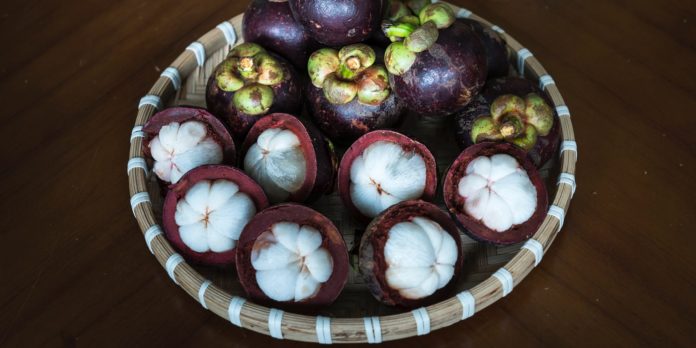How Healthy Is Mangosteen?
Mangosteen, also known as the Queen of Fruits and the Food of the Gods, is a sweet and tart fruit growing in Southeast Asia, particularly Thailand, Malaysia, and Singapore. It also happens to be Thailand’s national fruit. The purple fruit has a segmented white fleshy pulp containing seeds. While the scientific name for the fruit is Garcinia mangostana, it is known and consumed in India under the names Mangustan (Hindi), Kaattampi (Malayalam), Kokam (Marathi), Hannu (Kannada), and Kao (Kannada) (Bengali). For its pleasantly tangy flavor, the tropical fruit has piqued the interest of many chefs and home cooks, including Queen Victoria.
Nutritional Facts of Mangosteen
Mangosteen is an antioxidant-rich fruit with a high concentration of xanthones in its white pulp. Polyphenols called xanthones have anti-inflammatory and anti-carcinogenic effects. Vitamin A, B-vitamins (vitamin B6, thiamin, niacin, riboflavin, and folate), vitamin C, potassium, and zinc are all found in abundance in the fruit. Mangosteen also contains minerals such calcium, magnesium, salt, phosphorus, carotene, and cryptoxanthin. Mangosteen juice is high in antioxidants and is commonly used as an “anti-aging” beverage in traditional medicine.
10 Amazing Benefits of Mangosteen
Rich Source of Antioxidants
Mangosteen is packed with antioxidants and vitamins. A class of naturally occurring polyphenol chemicals known as Xanthones is the particular antioxidant found in abundance in the fruit that offers it an advantage. Alpha Mangosteen and gamma Mangosteen are the two types of Xanthones found in Mangosteen. At least 20 Xanthones have been identified in Mangosteen fruit, the bulk of which are found in the fruit wall or pericarp. Free radicals generate oxidative stress, which is reduced by xanthones. Antioxidants defend the body from a variety of ailments, including the common cold and flu, cancer risk, and heart disease, by destroying free radicals.
Treats Alzheimer’s Disease
Mangosteen’s usefulness in treating Alzheimer’s disease is one of its many health benefits. Confusion and bewilderment, as well as difficulties remembering things, are indications of this condition.
Promotes Heart Health
 Are you battling hypertension? Here is some good news. Mangosteen is high in potassium, copper, magnesium, and manganese, all of which can aid with blood pressure control. Potassium, in particular, helps to counteract the negative effects of too much salt. It also contributes to heart health by maintaining a normal heart rate and reducing the risk of heart attacks. Mangosteen also helps to lower cholesterol levels in the body, as well as blood pressure and heart disease risk.
Are you battling hypertension? Here is some good news. Mangosteen is high in potassium, copper, magnesium, and manganese, all of which can aid with blood pressure control. Potassium, in particular, helps to counteract the negative effects of too much salt. It also contributes to heart health by maintaining a normal heart rate and reducing the risk of heart attacks. Mangosteen also helps to lower cholesterol levels in the body, as well as blood pressure and heart disease risk.
Alleviates Menstrual Issues
Mangosteen root has long been regarded to aid in the regulation of women’s menstrual cycles. It also relieves the unpleasant symptoms that typically occur before and during menstruation, making it simpler for women to go about their regular lives.
Immunity Booster
The Xanthones, in combination with the abundant vitamin C contained in Mangosteen, work wonders for a stronger immune system. While Xanthones aid in the battle against free radicals, vitamin C aids in the creation and function of leukocytes, or white blood cells, which are necessary for good immunity. The higher the number, the more resistant you are to infection.
Promotes Blood Flow
Mangosteen promotes red blood cell production and protects against anemia. It helps to protect us against diseases like atherosclerosis, excessive cholesterol, heart congestion, and severe chest pains by improving blood flow and encouraging blood vessels to dilate.
The Answer to your Stomach Issues
Mangosteen is high in fiber, thus it can help with a variety of digestive issues. It can aid in the prevention of constipation. The pericarp and peel of this tasty fruit have been shown to be beneficial in treating diarrhea and dysentery. The fruit’s high fiber content also boosts your prebiotic consumption, which is beneficial to your intestines.
Enhances Skin Care
The antibacterial and antimicrobial qualities of Mangosteen, as well as the star component Xanthones, can help to reduce the risk of many skin diseases by healing damaged cells. And who can forget the rich vitamin C content, which promotes skin health even more? People have used Mangosteen to treat acne. Its capacity to scavenge free radicals, together with the reduction of Cytokins production (a significant contributor to acne), can help to keep your skin clear. Mangosteen can also help to slow down the aging process. Oxidative stress induced by free radicals contributes to the indications of aging, which is effectively combated by the antioxidants in Mangosteen. Catechin, a powerful antioxidant, protects your skin from wrinkles and other indications of aging.
Aids Weight Loss
 Yes, Mangosteen can help you shed some pounds. The fruit is low in calories (63 calories per 100 gram), saturated fat-free, and cholesterol-free. It’s also high in dietary fiber. So, fill yourself on the delectable food now!
Yes, Mangosteen can help you shed some pounds. The fruit is low in calories (63 calories per 100 gram), saturated fat-free, and cholesterol-free. It’s also high in dietary fiber. So, fill yourself on the delectable food now!
Accelerates Healing
Mangosteen is good for wound healing because of its antibacterial and anti-inflammatory characteristics. The tree’s leaves and bark can be combined with other therapeutic plants and applied to wounds to speed up healing. The therapeutic drink can be made by boiling the tree’s leaves and bark.
How to Consume Mangosteen
Mangosteen is simple to prepare and eat, but depending on where you live, it may be tough to locate. The season for this fruit is relatively short, which limits its availability. It’s best to hunt for it in specialty Asian markets, but keep in mind that fresh Mangosteen might be pricey. Frozen or canned varieties may be less expensive and easier to locate, but canned versions frequently have additional sugar. The fruit is also available as a powdered supplement or as a drink. If you can get your hands on some, look for fruits with a smooth, dark purple outer skin. The rind is inedible, but with a serrated knife, it can be easily removed. When ripe, the interior meat is white and highly juicy. For a delightful boost of flavor, you can eat this part of the fruit raw or add it to smoothies or tropical fruit salads.
Adverse Effects of Mangosteen
Consuming Mangosteen in its complete form has been linked to a few negative health impacts, thus it’s probably safe for most individuals. More concentrated forms, such as supplements, drinks, or powders, are not without risk. Early study suggests that xanthones, which are contained in herbal supplements, may help to reduce the clotting process. Since Mangosteen is high in xanthones, it’s best to stay away from concentrated Mangosteen if you have a blood clotting disorder or are on blood thinners. Also, because there isn’t enough research on whether Mangosteen supplements are safe for pregnant or breastfeeding women, it’s probably better to avoid them during these times. Before making significant dietary changes or using a new nutritional supplement, always consult your doctor or another trained health practitioner.
Now that you Know…
The Mangosteen fruit is a tropical fruit native to Southeast Asia. It’s praised for its plethora of possible health benefits, the majority of which are linked to its nutritional profile and antioxidant content. Many of these alleged advantages, however, have yet to be scientifically validated in human trials. Because Mangosteen is a somewhat obscure fruit, fresh Mangosteen may be difficult to come by. Canned, frozen, and supplementary forms, on the other hand, are increasingly common. Its juicy, subtly sweet flavor complements smoothies and fruit salads perfectly. Whether you try it for its culinary appeal or for its possible health benefits, it’s a win-win situation.




